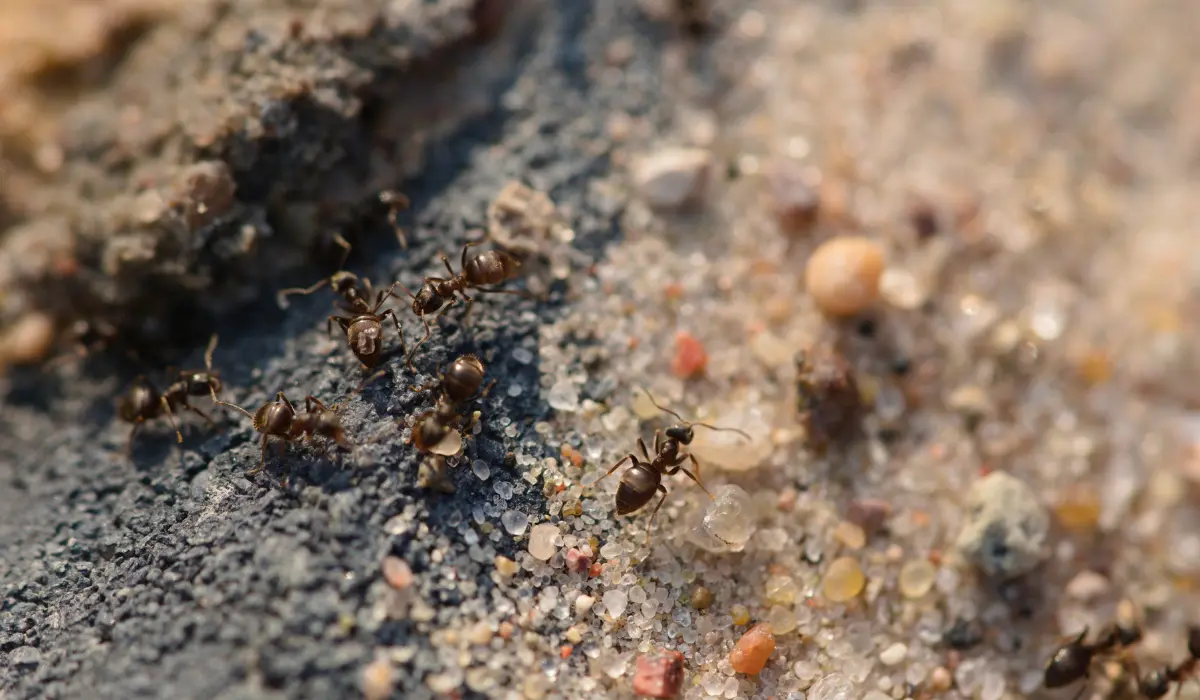
Did you know that pavement ants can often be found around your home, particularly in cracks in the pavement? These ants cannot bite but may sting. But their stings are generally harmless to humans.
Why should you care about these tiny insects? Keep reading to learn everything from where they live to how you can prevent their stings.
Key Takeaways
- Pavement ants sting, not bite, when they feel threatened, but it’s usually not very painful.
- Many mistake pavement ants for more aggressive species that bite due to their similar appearance and tendency to appear in large groups.
- If stung by a pavement ant, cleanse the area with soap and water, apply a cold compress to reduce swelling, and consider using a soothing cream.
- Prevent pavement ant stings by maintaining cleanliness and engaging professional pest control services for customized solutions.
DO PAVEMENT ANTS HAVE THE ABILITY TO BITE?
Pavement ants are common ants in North America. They use their mandibles primarily for carrying food and building nests, not for biting.
When disturbed, these species of ants do not bite but can sting. Unlike the painful stings of fire ants, those from pavement ants are mild. It is mostly used defensively when threatened.
Compared to other ants like carpenter ants or fire ants, pavement ants have a much milder impact. Fire ants have venomous stings, while carpenter ants can cause structural damage to wood.
Meanwhile, like sugar ants, they have a weaker stinger that generally may penetrate the human skin where it is thin.
WHY DO PEOPLE THINK PAVEMENT ANTS BITE?
Confusion with similar-looking insects leads some to mistakenly believe that pavement ants bite.
These ants are small and dark and often seen in large numbers, which can be alarming. Their aggressive nature, when disturbed, adds to this assumption.
While pavement ants can fight with their mandibles, they don’t have the same impact as other insects known to bite or sting.
This misunderstanding is further compounded when people compare them to carpenter ants or termites, which inhabit similar environments.
WHAT TO DO IF YOU SUSPECT A PAVEMENT ANT STING
Pavement ants can indeed sting, causing discomfort or mild allergic reactions. So, it’s crucial to promptly address the sting and recognize when professional help is necessary.
First aid for pavement ant stings alleviates pain and prevents infections. Here’s what you can do:
- Use soap and water to clean the area.
- Apply a cold compress for 10–15 minutes.
- Use hydrocortisone cream or calamine lotion for topical relief.
- Take an over-the-counter antihistamine if there’s itching or swelling.
In some cases, stings can cause allergic reactions requiring medical attention. Knowing when to seek help is vital.
Watch for severe symptoms, such as difficulty breathing, facial or throat swelling, or dizziness. These signs indicate a severe allergic reaction (anaphylaxis) requiring immediate care.
HOW TO PREVENT PAVEMENT ANT STINGS
Preventing pavement ant stings can be achieved through simple DIY pest control measures while professional services are on their way.
For homeowners, you can take these steps to limit ant activity around your property:
- Seal Cracks: Use caulking to seal gaps in walls and baseboards.
- Clean Food Areas: Remove leftovers and store food properly.
- Outdoor Maintenance: Keep patios and driveways free of debris.
- Ant Baits: Place ant baits near trails to control colonies.
- Natural Remedies: Make use of household items as natural remedies.
- Insecticide Sprays: Apply around entry points to repel ants.
- Mulch Management: Regularly inspect and replace mulch.
WHEN SHOULD YOU CALL A PROFESSIONAL?
If you find pavement ant nests inside the walls or foundation of your property, don’t hesitate to get pest control help.
Whether you’re in Baton Rouge or New Orleans, seeking expert help should be easy. For immediate intervention for a severe infestation, let Lajaunie’s ant control specialists tailor a solution that’s right for your home.